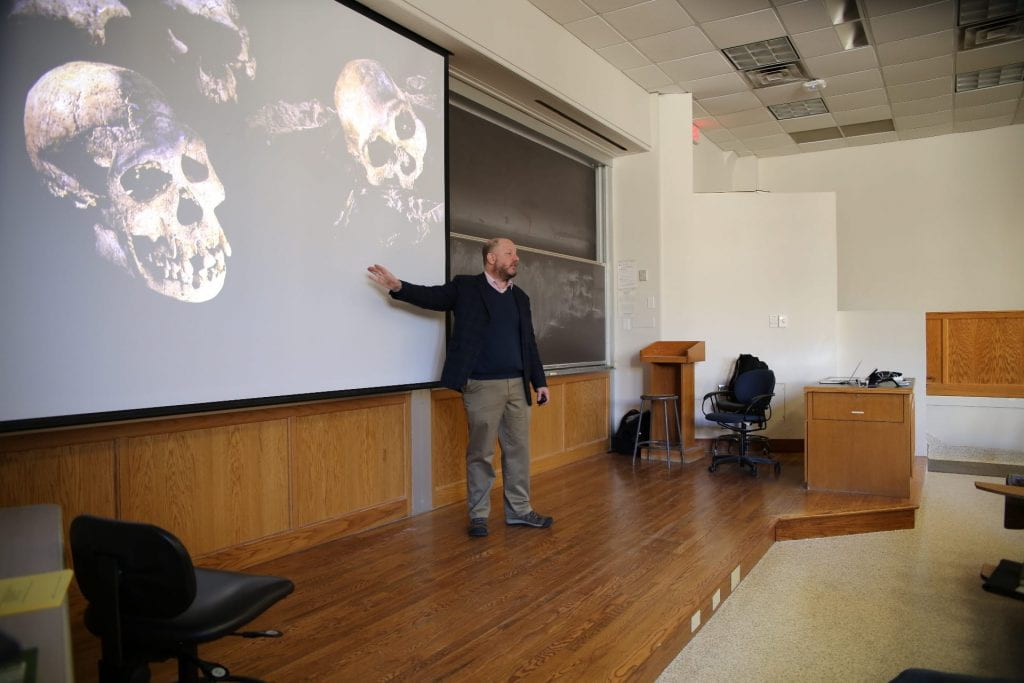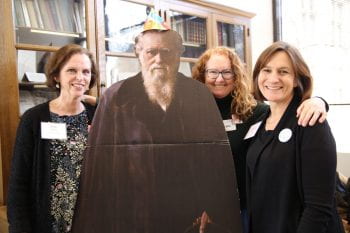There was cake, balloons and a rousing singalong of Happy Birthday. The man himself – Charles Darwin – stood off in a corner ready to pose for selfies. A birthday hat sitting atop his head.
OK, it wasn’t the real Darwin, but a life-size cutout. However, the celebratory feel was real as 60 educators and some special guests celebrated one of the world’s greatest scientist and the man behind the theory of evolution at the 7th annual Darwin Day event hosted by the Institute for School Partnership at Washington University in St. Louis.
The Feb. 9 event on the Danforth Campus was timed to the anniversary of Charles Darwin’s birth – his 210th this year. The international celebration is used as an occasion to focus on education and outreach in evolutionary biology. The ISP’s free program for K-12 educators features presentations, workshops and of course cake. It’s also a great opportunity for participants to network with other educators and scientists.

The day started with a presentation by John Hawks, a paleoanthropologist at the University of Wisconsin-Madison, who in 2015 helped lead an excavation team that retrieved fossils from a South African cave that turned out to be a new species of early human. His talk was titled “New Discoveries and insights into out African origins.” It was followed by a Q-and-A session, where he fielded a multitude of questions, including this one from an audience member: How do you deal with science skeptics and people who question the value of your research?
Simply put, he said the discoveries from his field research help cure diseases and create jobs for people in Africa. But, most importantly, his research helps us know ourselves.
“This history is what makes us human,” said Hawkins.
Darwin Day also included a big reveal – the unveiling of the of the new Kirk Teacher Fellow – Katie Lodes, a science teacher at St. Joseph’s Academy. Over the next three years she will take on the role of facilitating the evolution book club and planning the evolution education events.
The teacher fellowship is named for David and Marilyn Kirk, longtime members of the WashU community, whose generous endowment makes ISP’s evolution education program possible. That includes not only the teacher fellowship, but the annual Darwin Day celebration and an evolution education book club.
This was one of David’s favorite days
This year’s annual Darwin Day celebration was a bittersweet affair, tinged with the feeling that something or someone was missing. It was the first Darwin Day celebration without David Kirk who passed away in November after a long illness. Kirk was very hands-on in planning Darwin Day, from selecting the speakers to buying the fossils that are raffled off. In fact, the second speaker of the day, WashU doctoral student Gavriel Matt, had been invited to speak by Kirk himself, after Kirk learned Matt’s work is focused on studying Volvocine green algae, the same research area as Kirk.
“This was one of David’s favorite days, so it’s a celebration of mixed emotions for me” said an emotional Victoria May, executive director of the ISP. “It’s important we remember him and his legacy.”

During a special remembrance of Kirk, Didi Noelker, chair of the science department at Villa Duchesne High School, and a former Kirk Teacher Fellow, called him an immense influence in her life and a wonderful mentor to countless other teachers in the region.
“This wouldn’t exist without him,” she said. “He was concerned about how evolution is presented in education in classrooms and knew getting teacher involvement and buy-in was key.”
Dr. Kirk’s son, Randolph Kirk, traveled from Flagstaff, Arizona, for the remembrance. He expressed gratitude for the opportunity to remember his dad “in this context.” By that, he meant that while his dad loved research, he adored his outreach efforts.
February 2019 | by, Myra Lopez
